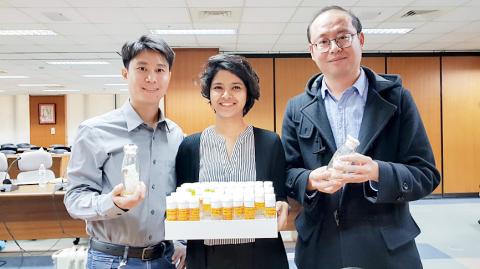A team of Academia Sinica researchers yesterday said that they have found the neural mechanism that coordinates fruit flies’ states of thirst and hunger, which they said might help with studies on eating disorders and depression in humans.
The flies’ responses to learned odor cues of food and water are associated with a neurotransmitter called leucokinin, Institute of Molecular Biology assistant research fellow Lin Sue-wei (林書葦) told a news conference in Taipei.
When the flies are dehydrated, leucokinin is released, driving them to search for learned water cues by inhibiting two groups of dopamine-releasing neurons (thirst-DANs), which restrict the flies’ water-seeking behaviors, he said.

Photo: Chien Hui-ju, Taipei Times
The neurotransmitter is also released in starving flies and activates another group of dopamine-releasing neurons linked to hunger cues, he said.
The team observed fly brains under microscopes, using fluorescent proteins to highlight their neurons, Lin said, adding that existing genetic tools for fruit flies have enabled scientists to control each of the flies’ neurons.
The researchers found that other neurotransmitters, such as serotonin, increase the activity of the thirst-DANs and offset the effect of leucokinin on these neurons, so that thirst-DANs continue to restrict their water-seeking behaviors, preventing hungry flies from searching for water instead of food.
Their research showed that the flies’ thirst and hunger drives are coordinated by multiple neurotransmitters, instead of entirely separate ones, a phenomenon that might also occur in other creatures, he said.
Although fruit flies only have 100,000 neurons in their brains, compared with 100 billion neurons in human brains, the team’s findings might help with studies on human diseases, such as depression, anorexia and addictions, and corresponding treatments, Lin said.
Behaviors related to other drives, such as sexual desire or the need to find safety, might share some commonalities with the neural mechanisms associated with hunger and thirst, he added.
The study was published in the journal Nature Neuroscience in October, with Bhagyashree Senapati listed as the lead author.
An Indian doctoral student studying at the institute’s International Graduate Program, Senapati majored in protein biology at the National Institute of Technology, Rourkela in India, before enrolling in the institute in 2015.

A small number of Taiwanese this year lost their citizenship rights after traveling in China and obtaining a one-time Chinese passport to cross the border into Russia, a source said today. The people signed up through Chinese travel agencies for tours of neighboring Russia with companies claiming they could obtain Russian visas and fast-track border clearance, the source said on condition of anonymity. The travelers were actually issued one-time-use Chinese passports, they said. Taiwanese are prohibited from holding a Chinese passport or household registration. If found to have a Chinese ID, they may lose their resident status under Article 9-1

Taiwanese were praised for their composure after a video filmed by Taiwanese tourists capturing the moment a magnitude 7.5 earthquake struck Japan’s Aomori Prefecture went viral on social media. The video shows a hotel room shaking violently amid Monday’s quake, with objects falling to the ground. Two Taiwanese began filming with their mobile phones, while two others held the sides of a TV to prevent it from falling. When the shaking stopped, the pair calmly took down the TV and laid it flat on a tatami mat, the video shows. The video also captured the group talking about the safety of their companions bathing

PROBLEMATIC APP: Citing more than 1,000 fraud cases, the government is taking the app down for a year, but opposition voices are calling it censorship Chinese Nationalist Party (KMT) Chairwoman Cheng Li-wun (鄭麗文) yesterday decried a government plan to suspend access to Chinese social media platform Xiaohongshu (小紅書) for one year as censorship, while the Presidential Office backed the plan. The Ministry of the Interior on Thursday cited security risks and accusations that the Instagram-like app, known as Rednote in English, had figured in more than 1,700 fraud cases since last year. The company, which has about 3 million users in Taiwan, has not yet responded to requests for comment. “Many people online are already asking ‘How to climb over the firewall to access Xiaohongshu,’” Cheng posted on

A classified Pentagon-produced, multiyear assessment — the Overmatch brief — highlighted unreported Chinese capabilities to destroy US military assets and identified US supply chain choke points, painting a disturbing picture of waning US military might, a New York Times editorial published on Monday said. US Secretary of Defense Pete Hegseth’s comments in November last year that “we lose every time” in Pentagon-conducted war games pitting the US against China further highlighted the uncertainty about the US’ capability to intervene in the event of a Chinese invasion of Taiwan. “It shows the Pentagon’s overreliance on expensive, vulnerable weapons as adversaries field cheap, technologically